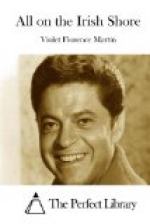A shrill neigh arose in front of them. The mare had pulled up at a closed gate, and was apparently apostrophising some low farm buildings beyond it. A dog barked hysterically, the door of a cowshed burst open, and a man came out with a lantern.
“Oh, I know now where we are!” cried Fanny wildly, “it’s Johnny Connolly’s! Oh, Johnny, Johnny Connolly, we’ve been run away with!”
“For God’s sake!” responded Johnny Connolly, standing stock still in his amazement, “is that Miss Fanny?”
“Get hold of the mare,” shouted Rupert, “or she’ll jump the gate!”
Johnny Connolly advanced, still calling upon his God, and the mare uttered a low but vehement neigh.
“Ye’re deshtroyed, Miss Fanny! And Mr. Gunning, the Lord save us! Ye’re killed the two o’ ye! What happened ye at all? Woa, gerr’l, woa, gerrlie! Ye’d say she knew me, the crayture.”
The mare was rubbing her dripping face and neck against the farmer’s shoulder, with hoarse whispering snorts of recognition and pleasure. He held his lantern high to look at her.
“Musha, why wouldn’t she know me!” he roared, “sure it’s yer own mare, Miss Fanny! ’Tis the Connemara mare I thrained for ye! And may the divil sweep and roast thim that has it told through all the counthry that she was killed!”
A GRAND FILLY
I am an Englishman. I say this without either truculence or vainglorying, rather with humility—a mere Englishman, who submits his Plain Tale from the Western Hills with the conviction that the Kelt who may read it will think him more mere than ever.
I was in Yorkshire last season when what is trivially called “the cold snap” came upon us. I had five horses eating themselves silly all the time, and I am not going to speak of it. I don’t consider it a subject to be treated lightly. It was in about the thickest of it that I heard from a man I know in Ireland. He is a little old horse-coping sportsman with a red face and iron-grey whiskers, who has kept hounds all his life; or, rather, he has always had hounds about, on much the same conditions that other men have rats. The rats are indubitably there, and feed themselves variously, and so do old Robert Trinder’s “Rioters,” which is their nom de guerre in the County Corkerry (the few who know anything of the map of Ireland may possibly identify the two counties buried in this cryptogram).
I meet old Robert most years at the Dublin Horse Show, and every now and then he has sold me a pretty good horse, so when he wrote and renewed a standing invitation, assuring me that there was open weather, and that he had a grand four-year-old filly to sell, I took him at his word, and started at once. The journey lasted for twenty-eight hours, going hard all the time, and during the last three of them there were no foot-warmers and the cushions became like stones enveloped in mustard plasters. Old Trinder had




